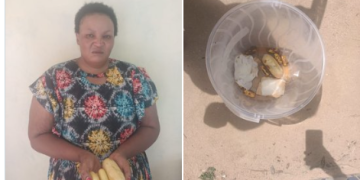Another Kenyan teacher has received the World Health Organization’s (WHO) global medal for his efforts in tobacco reduction.

Joel Shunza Gitali was honored for his life’s effort in combating tobacco use and addiction, particularly among children and adolescents.
“We are pleased to announce that the World Health Organization has named Kenyan teacher and tobacco control advocate Mr Joel Shunza Gitali as a winner of this year’s World No Tobacco Day Award.
“Mr Gitali, who is also chairman of the Kenya Tobacco Control Alliance, was selected from hundreds of nominations from the 194 WHO member states,” the Kenya Tobacco Alliance indicated in a statement.
Gitali, who spoke shortly after being announced the winner, said the prize motivated him to work more in the fight against young tobacco addiction.
“It made me feel energised. I give credit to members of civil society in Kenya. They have visited all corners of the country fighting tobacco use.
“They also came in strongly to support my nomination. This is a sign of teamwork and cooperation,” the activist stated.
Gitali’s work against tobacco consumption started in the 1970s as a child. He stated that he was inspired by his mother, who was a Community Health Volunteer.
“My mother was CHV having been trained by Unicef and used to tell us the dangers of tobacco,” he said. “Also, my wife is a nurse and we were staying at Maseno Hospital when we were newly married. I could see how people’s lifestyles were the causes of illnesses.”
“At that time, I began a community cultural group, Social Liberation and Health Promotion Club (now a community-based organisation). We began in Maseno in 1995 but the CBO later shifted to Kakamega. The purpose was to cause social change and cultural transformation in the society to enhance good health,” Gitali recalled.
However, when working as a guidance and counselling teacher in 1996, the impact of tobacco smoking among young people was brought to the instructor’s attention.
“Students addicted to tobacco and drugs have a problem of not concentrating yet the school environment doesn’t permit them to smoke. Such students become defiant, they steal from others in order to buy cigarettes. They also sell books and so can’t perform well,” Gitali stated.
“They’re ever worried they will be found out. They are not settled. They are afraid of going to teachers for consultation fearing they smell tobacco or bhang. They keep avoiding teachers and parents and fellow students. Some, when they have not smoked, don’t come to school or feign sickness,” he noted.
Kenya’s Ministry of Agriculture, Livestock, and Fisheries was also commended for introducing alternative crops to tobacco-growing regions.











































